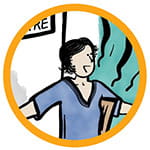Surgical Care Practitioner
 Surgical Care Practitioners are registered non-medical healthcare professionals who have extended the scope of their practice by completing an accredited training programme. They work as members of the surgical team and perform surgical interventions and pre-operative and post-operative care under the supervision of a senior surgeon. Learn more about the logistics of the role on our case study page.
Surgical Care Practitioners are registered non-medical healthcare professionals who have extended the scope of their practice by completing an accredited training programme. They work as members of the surgical team and perform surgical interventions and pre-operative and post-operative care under the supervision of a senior surgeon. Learn more about the logistics of the role on our case study page.
In 2022 the Royal College of Surgeons of England and the Royal College of Surgeons of Edinburgh published the 2022 Curriculum Framework for SCPs. The curriculum establishes the standard required to work as an SCP and provides guidance for SCPs to develop into competent practitioners. The curriculum offers a guide to the education and incremental development of SCPs in both academic and clinical settings.
Did you know that Surgical Care Practitioners are now eligible to join RCS England as Surgical team members? Find out more and join today.
